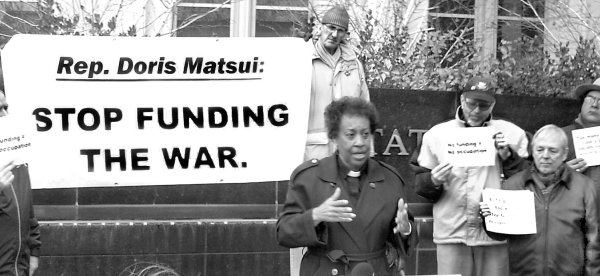
| Back to Table of Contents |  |
Back to Partisan Home |
| Previous Section | Next Section |

Photo by Cres VellucciBishop Beverly Shamana speaks to press conference in Sacramento on Jan. 5 demanding that Rep. Doris Matsui (D-Sacramento) vote against war funding. Behind her, from left, are Peace and Freedom Party activists Jerry Frink, John Reiger, and C.T. Weber. |
Polls and commentators agree that the swing to the Democrats in the November 2006 election was a reaction to the Iraq war and occupation, as well as to open corruption on the part of the Republican majority in both houses of Congress. But the result shows as clearly as ever that the Democratic Party also represents the corporations and their wealthy owners. The first thing Nancy Pelosi (D-San Francisco) did upon claiming victory as the new House majority leader was to reassure her corporate backers that impeachment would not be on the table in the new Congress, and the Democrats would continue to vote for funds for Bush's disgraceful wars.
So encouraged was Bush by the tame Democratic pledge of support for his wars, that he announced on January 10th that he would send over 20,000 fresh troops into Iraq to try for victory. Restive Democratic members of the House and Senate, well aware that they had achieved their majority because the overwhelming majority of Americans reject the war, promised to hold hearings. Even Senator John "Send More Troops" Kerry, who lost the 2004 presidential election after refusing to oppose the war, expressed his opposition to increased troop levels. At press time, Senators were working on a toothless non-binding resolution. But almost every Democrat who spoke up against sending more troops also promised to vote for additional money to pursue the war in Iraq at current troop levels.
As Bush pushed his escalation in Iraq, his threats against Iran and Syria and his bombings in Somalia drew not a whimper of opposition from most Democratic Party officeholders. Neither has any Democratic leader raised questions about the Afghan war, where casualties increase steadily as US troops prop up a deeply unpopular government of utterly corrupt warlords. There were a few questions after it was announced by a U.N. agency that the Afghan opium crop had broken all records, but no Congressional leader has spoken out against the warlords' brutality toward women and workers, who have no rights under the US-backed regime.
Having been fooled into electing pro-war Democrats to defeat pro-war Republicans, frustrated voters may be willing to turn to progressive third party candidates in 2008. Meanwhile, sufficient pressure from voters, particularly in the streets, may push some of the Democrats and Republicans now in Congress to stop their support for war funding. Demonstrations were held in hundreds of cities and towns on January 11, after Bush announced he was sending more troops to Iraq, and larger demonstrations are planned on January 27 and on the anniversary of the war on March 20. The Mayday rallies for immigrant rights in many cities are also expected to have a strong anti-war message.
At the congressional district level, angry Democratic and Republican voters are joining with independent left activists to pressure members of congress to stop voting for war funding. In Sacramento, a community press conference early in January was followed by a sit-in at the office of Doris Matsui (D-Sacramento), who says she opposes escalation but refuses to stop voting funds for the war. One of those joining the sit-in was John Reiger, the Peace and Freedom Party nominee against Matsui in November. He points out that Matsui's statements that she must vote for war funding or leave soldiers defenseless on the field of battle are nonsense. "The money already approved can be used to bring them home," Reiger told reporters. Around the country, rallies and vigils demanding an end to war funding have been held at the offices of at least 120 members of Congress.
| Back to Table of Contents |  |
Back to Partisan Home |
| Previous Section | Next Section |